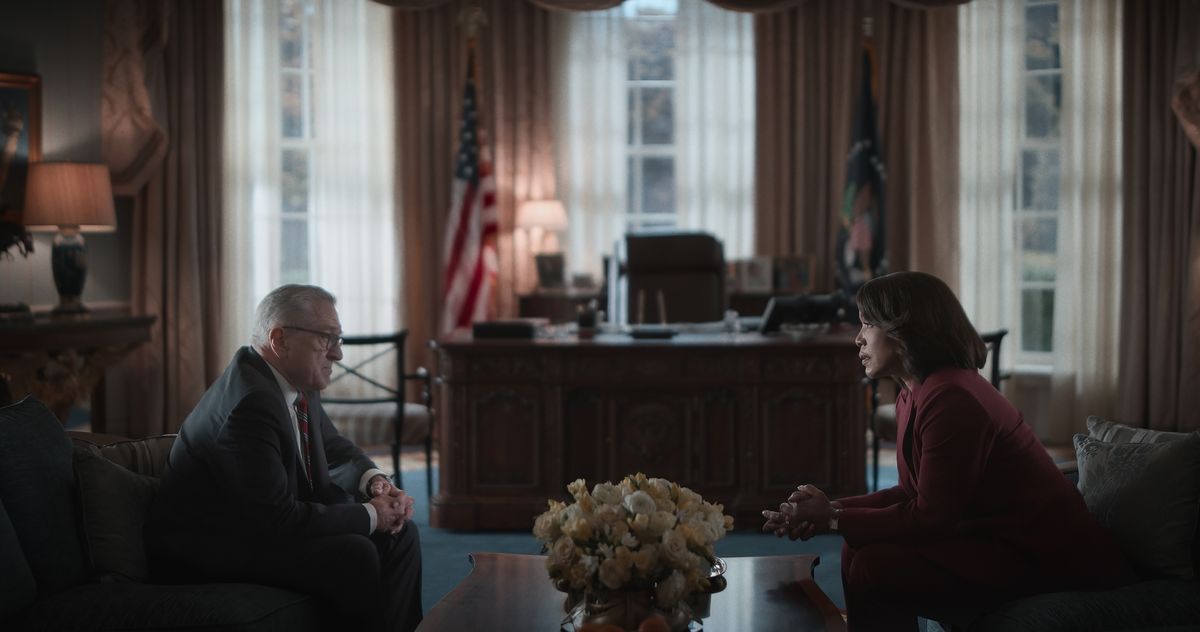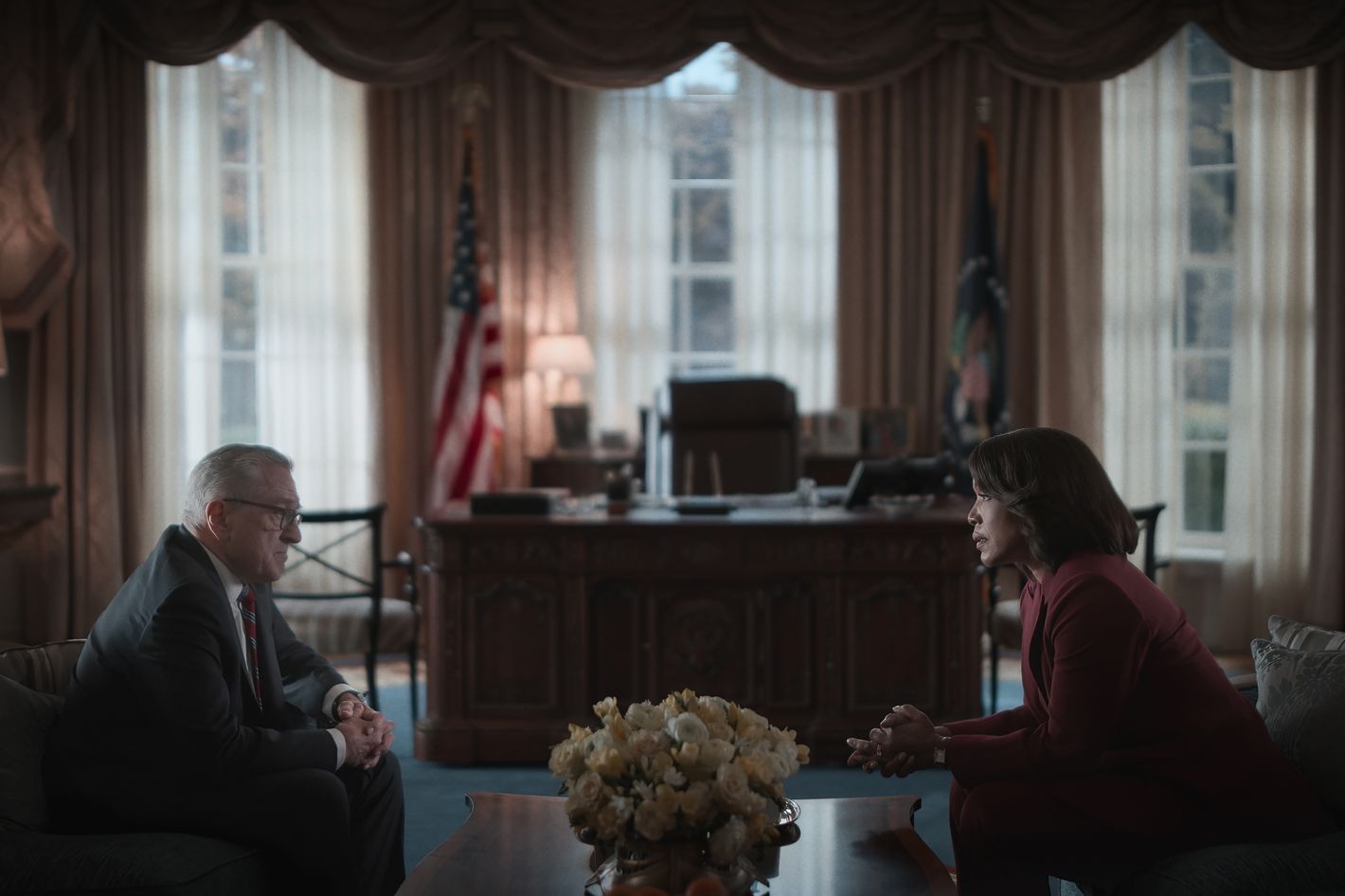Zero Day Series-Premiere Recap: Who Killed Bambi?
Robert De Niro returns to Netflix to portray a former U.S. President called back into action in the wake of a devastating cyber attack.


The political landscape of Zero Day, Netflix’s new limited series, takes from our reality the erosion of people’s faith in the institutions supposed to protect them, the grip of conspiracy thinking to explain the resulting despair, and nostalgia for a time when “things used to be better.” Robert De Niro plays former U.S. President George Mullen, the “last president in modern memory who was able to consistently rally bipartisan support.” His spotless legacy is a reminder of a time when people felt like they could trust their commander-in-chief’s judgment.
George is an obsessive chronicler of his own role in history: in his study, nestled in an idyllic Hudson estate, a floor-to-ceiling shelf is filled with hundreds of black Moleskines, meticulously dated and labeled. Disaster strikes just as his publisher sends him a young ghostwriter, Anna Sindler, to help shape them into a memoir — not that he welcomes her questions about his past. When she briefly brings up the tragic loss of his son and subsequent decision not to pursue re-election, he assures her he doesn’t need her help: he will submit the memoir draft soon, and he’ll do it alone.
George lives something of a hermit’s life in Hudson. He swims, he runs, he plays with his adorable Golden Retriever, Del. He takes pills for high cholesterol. He has an affectionate rapport with his wife, Sheila, who has just been confirmed as a federal judge, but they sleep on different beds. His daughter Alex, a congresswoman, doesn’t like speaking to him much, particularly not about non-political affairs. The overwhelming impression is that, after serving with integrity and making an exit from public life with dignity, George has lived, mostly, for himself. The Zero Day cyber attack, which strikes on the afternoon of his meeting with Anna and takes her life, is the inciting incident that drags him back into the public sphere.
For exactly one minute, a power outage shuts down dozens of software systems across the country, powering down cell phones, televisions, computers, traffic lights, and every manner of computerized system. Before shutting down, screens everywhere display a threat: “THIS WILL HAPPEN AGAIN.” Anna was looking at it when a train crashed at full speed into her car. Through a newscast at George’s house, we learn that the transportation sector was one of the biggest targets of the cyber attack: across the country, trains derailed, planes crashed, and subways collided. They call it Zero Day after “a cyber breach that targets unknown vulnerabilities in software systems.” I do not know what any of these words mean, but we get the gist. It’s apocalyptic.
A former staffer named Roger Carlson (played by a wiry and always wonderful Jesse Plemmons) comes by the house to tell George that the country needs him. He’d gotten a call from the White House asking George to visit a still-active rescue site in Manhattan, shake hands with the first responders, and help strengthen morale. George hesitates at first, but Roger’s appeal to his “strong leadership” and ability to make people feel like “they’re not alone” works. He exercises that power at the site when a man’s cries about crisis actors, insurance scams, government agents, and socialist traitors cause an altercation. George’s voice rises above the ruckus: he is firm, honest, and exceedingly paternalistic, like the class’s favorite teacher scolding their naughty behavior. It’s a cheesy moment, complete with rising violins behind George’s invocation of “real patriotism,” but it works –– the speech is on every screen in the country before he’s made it back to Hudson. Alex doesn’t like any of it: she calls Roger to accuse him of opportunism. It was his idea, not the White House’s, to send George to the site. Any political story is a musical-chairs game of opportunism, so I’m looking forward to watching these two fight for the top.
In the meantime, the current president, a woman named Evelyn Mitchell, is herself attuned to opportunity. Seizing his viral moment, she calls George to the Oval Office to offer him the chairmanship of a special investigatory commission, accorded with “extraordinary powers” of surveillance and jurisdiction, tasked with figuring out just what the hell is going on. “The only thing more important than a quick result is a result everyone can trust,” she pleads with him. Even before he knew what she was going to ask him, George and Sheila had already all but decided he wouldn’t reenter the national political stage. It was rare enough to get out while ahead; George’s sturdy reputation owed itself at least partly to the fact that he’d kept out of the way since the end of his term, and jumping back into a changed landscape might compromise his image. The fact that Sheila is at a crucial moment in her own career as a public servant is mentioned once and never again.
Up until this moment, the show had me –– I felt invested in George’s dilemma, the architecture of the cyber attack, and the dynamics of his domestic life. But when, on the way home from the White House, George told his driver to take a right and drop him off at Langley, Virginia, and when I found out Bill Camp was going to play Jeremy Lasch, the director of the C.I.A., it earned my undivided attention. Jeremy tells George it’s all worse than he thinks, but when he’s about to tell him what exactly is worse, the walls of their conference room turn opaque and soundproof. Their talk is confidential, even from us, which is a bit of a cop-out. We know it really is bad, though, because when he comes back to the car, George is visibly shaken. Roger instinctively hands him a brand-new Moleskin. “Someday, the rain is going to come and wash all this scum off the streets,” he begins (just kidding).
Later that day, at Sheila’s confirmation celebration, Alex tells George she plans to vote against the commission because it is fascist. Though she makes some good points about the rapid rise of abusive forces in the rarefied halls of power, it’s also obvious she has her own agenda: we just don’t know what it is yet. She is always cursing under her breath and getting mysterious “we need to talk” texts from unknown numbers, and she definitely has history with Roger. We learn from their flirtatious banter that she resents her dad for thinking she was not ready to run, even though she’s won two elections. In a refrain that will become as common to this show as the use of handheld camera movement and extreme close-ups, she reminds Roger that the world is not the same as when George was in office. He will never survive a political comeback “in this climate.” Sheila is inclined to agree; her exact words are that the commission is “the biggest affront to civil liberties ever committed in this country.” This is why it must be George leading it: supposedly, he is incorruptible.
George has a Deep Throat, a man named Natan who also calls himself his friend. They communicate under the guise of a dry cleaning service, though Natan warns that when it comes to the matter at hand, there will soon be a time when he won’t be able to pick up. What he can tell George as of now is that the Russian military intelligence agency GRU has been funding a group of hackers in New York to cause “garden variety” mayhem through ransomware schemes and the like, having employed an individual named Felix as the leader of the bunch. Felix may be the mastermind behind a server farm in the Bronx with enough resources to launch a mass cyber attack. We know this is a real lead because throughout the episode, we’ve been following a Russian agent named Alexi Lebedev as he works to intimidate a young hacker into giving him Felix’s new secure location. Having successfully received it, he shreds a bunch of paper, a totally unsuspicious thing to do.
On the third morning after Zero Day, George announces that he will accept the offer to be the head of the commission, which passed through Congress with “overwhelming bipartisan support.” Among the crowd of press gathered outside his house, he sees the face of Anna Sindler, the ghostwriter who visited him 100 years ago. This is one of a few hints that there is something wrong with George: every now and again, his vision blurs, and his hearing becomes muffled. The previous night, the sound of the Sex Pistols’ song “Who Killed Bambi?” overwhelmed his senses to the point of having to order the music to be shut off. In his speech, George invokes the memory of his old friend John Flanagan, an army colleague whose senseless murder in Brooklyn inspired George to become a prosecutor.
Things become really dramatic in the moments before George’s departure for D.C. In the middle of the previous night, Natan had called with essential updates. George took notes in his notebook, which he then locked in a safe. His frantic attempt to remember the safe’s combination is the scene that opened the episode. A concerned Secret Service staffer bangs on the door as the helicopter whirs overhead. It’s urgent that George get the notebook because Natan had called again, to tell him the information could be “the key to everything.” The real problem is that, when George is finally able to open the notebook, he realizes that all he wrote down was variations of the question “Who killed Bambi?”, The Shining-style, along with one unsettling note that reads “George killed Bambi.” George accuses someone of getting in the safe and replacing the notebook, and in a mad dash through his estate, fails to recognize his house manager Wayne; instead, he asks for Hector, who, Sheila has to remind him, retired five years ago. This is disturbing because we have been seeing George interact with Hector for the past hour.
President’s Daily Brief
• Between the red herring at the top of the episode and the notion that the real danger might not be without but within, etc, I found this first episode a little heavy-handed. But Zero Day has the potential to be pretty fun: it employs the tropes of the conspiracy thriller genre to bingeable effect. The dialogue is goofy, but that comes with the territory of a story that has this much explanation to get through. Mostly, I’m here for De Niro, who, at 81 years old, is tackling a new medium with characteristic panache.
• Here, the news serves two world-building functions simultaneously: it helps explain what’s going on and moves the story’s events closer to our reality, which seems to be one of the show’s stated purposes. Eric Newman, the show’s co-creator, was a producer on Alfonso Cuarón’s 2006 film Children of Men, which uses the same device and shares some of Zero Day’s sensibility.
• At the first sight of George’s Moleskin shelf, I thought of Don DeLillo’s 1988 masterpiece Libra and his description of the CIA’s library. “Nicholas Branch sits in the book-filled room, the room of documents, the room of theories and dreams…” It might be a perfect time for a re-read.








